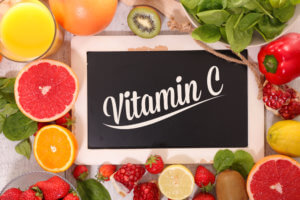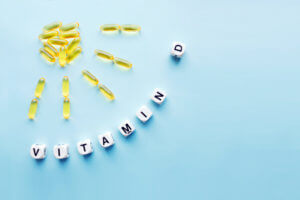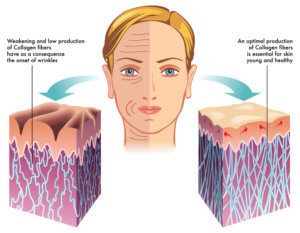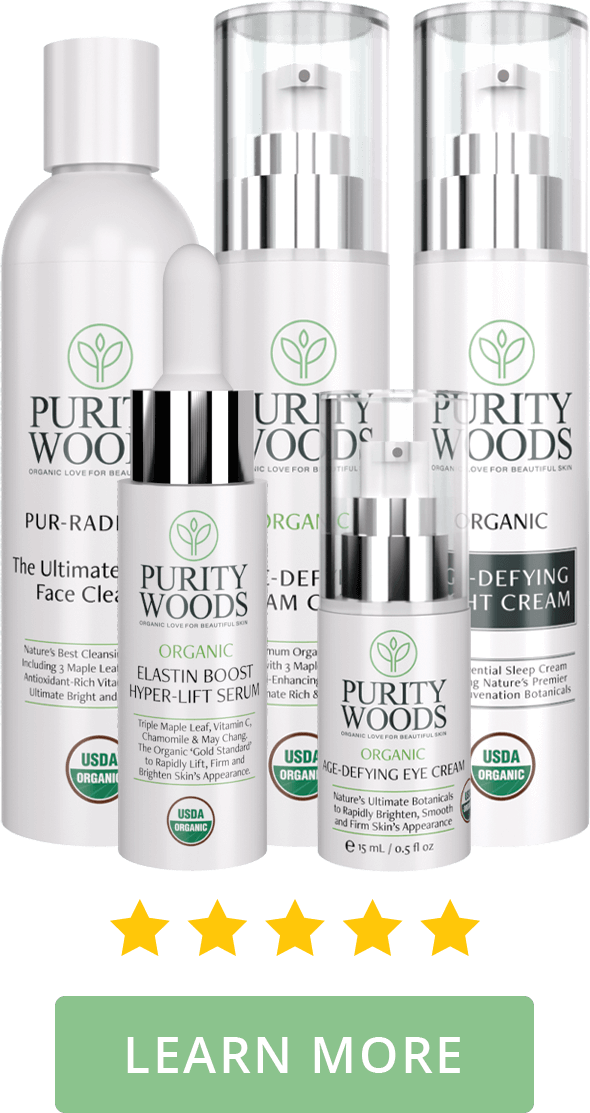Keeping your skin looking healthy and youthful is not just a matter of what you put on it. The nutrients that you feed your body also go a long way towards improving (or degrading) your complexion.
Of course, a healthy diet in general is highly beneficial for the health of your skin. However, there are some key vitamins and minerals that research has shown to be particularly powerful for healthy, youthful-looking skin.
By supplying your body with these specific nutrients, you also supply your largest organ (the skin) with the building blocks it needs to thrive.
Some of these vitamins and minerals are also highly effective when applied topically. Your skin soaks them up and can utilize them almost immediately for repair and regeneration.
With that in mind, here’s a closer look at the top nutrients to “feed” your skin for a glowing complexion.
Top Vitamins for Healthy Skin
Vitamin C

Vitamin C can be thought of as a top anti-aging nutrient for your skin. One of its biggest “claims to fame” is that it is a key catalyst for collagen synthesis.
Collagen has become something of a buzzword in the skincare industry. It’s the protein that makes up about 70% of your skin and gives it both strength and flexibility. Not only is collagen essential for wound healing, it also helps keep your skin looking tight, thick, firm, and wrinkle-free.
Unfortunately, the production of collagen in your body starts declining as you age. This causes your skin to start looking older and leads to deterioration.
And while collagen supplements are all the rage (yet often ineffective), vitamin C has been shown to naturally boost collagen, helping your body to actually make more of it.
Of course, the benefits of vitamin C for your skin don’t stop there. Studies have also shown that it helps protect your skin from UV damage, lightens hyperpigmentation, reduces redness, and may help fend off age spots and wrinkles.
Where to Get It: Vitamin C is abundant in a whole foods, plant-based diet. The top food sources include citrus, mangos, colored bell peppers, kiwi, leafy greens, and berries. It can also be directly applied to your skin. Look for vitamin C ingredients in skincare like mango butter, camu camu, rosehips, and Indian gooseberry (amla).
Vitamin E
Vitamin E is a fat-soluble antioxidant nutrient. It too has anti-aging power for your skin (especially when paired with vitamin C) and also works to keep your skin nourished and moisturized. In fact, your body naturally produces vitamin E and secretes it through sebum to prevent dryness.
Perhaps one of the biggest benefits of vitamin E is that it offers your skin photoprotection. This is the technical way of saying that it protects against UV damage to skin cells and tissues.
Damage from too much UV radiation is one of the biggest age-accelerators for skin and also impacts your skin’s integrity. Known as photodamage, repeated exposure to UV rays can show up in your complexion as fine lines, wrinkles, rough spots, thinning skin, age spots, discoloration, and cancer.
The best way to combat this type of damage is to prevent it in the first place— something vitamin E can help with.
Vitamin E has shown photoprotective properties, which means it helps limit acute and chronic UV damage and photoaging. It also has an anti-inflammatory effect that is very soothing for damaged skin.
Notably, vitamin E works even better when used alongside vitamin C. The two nutrients together have about double the photoprotective ability than either does alone.
Where to Get It: Nuts, particularly almonds, and seeds tend to be high in vitamin E. Avocados are another excellent food source. If you have dry skin, applying vitamin E oil topically can also be beneficial.
Vitamin D

Vitamin D, the sunshine vitamin, isn’t usually thought of as a skin-boosting nutrient, but it does a lot more for your skin than you might think.
Most of the vitamin D your body uses comes from sunlight. When the sun hits your skin, it triggers a process in which a substance known as 7-dehydrocholesterol gets converted into usable vitamin D3. This gets taken up by your liver and kidneys and transported in its active form to different cells, including skin cells.
Once it reaches your skin, vitamin D is thought to help maintain skin tone, promote wound healing, support skin cell metabolism, and protect against microbes and UV damage.
That’s quite a few functions, but all of these are a part of vitamin D’s “normal” job.
In fact, not getting enough of it is bad news for your skin. According to research, a deficiency of vitamin D is linked to skin issues like psoriasis, acne, eczema, and atopic dermatitis. This could explain why a vitamin D treatment (calcitriol) was found to help treat psoriasis.
Where to Get It: The best vitamin D comes from the sun. Obviously, overdoing UV rays is harmful to your skin. However, getting direct sunlight for just 15-20 minutes a day can help your body generate enough vitamin D.
Vitamin A
Vitamin A is an essential nutrient that can help with a variety of skin issues and is vital for youthful-looking skin.
There are two main forms of vitamin A: retinoids, which typically come from animal sources, and carotenoids, which typically come from plant sources. When consumed, your body has to convert either form into usable vitamin A in your liver.
For the most part, the skincare industry has focused almost all of its attention on retinoids.
Your skin is retinoid-responsive, which means that this type of vitamin A can have powerful effects when applied topically. Studies have shown that retinoids can diminish signs of aging, stimulate cell turnover and collagen production, and help treat acne.
The downside is that retinoid products can also make your skin dry, irritated, and red and heighten your sensitivity to UV rays (which accelerates aging).
Carotenoids, especially beta carotene, have many similar benefits but often receive very little hype. They help protect against photodamage, calm redness and inflammation, and may also help prevent skin cell damage, premature skin aging, and certain skin diseases.
The only “downside” to carotenoids is that you need to consume them rather than apply them.
Where to Get It: Eat orange-colored fruits and vegetables like carrots, pumpkin, sweet potatoes, mangos, and papaya to fill up on beta-carotene and other carotenoids. Because of the downsides, retinoid/retinol products are not ideal for skincare. Instead, try the natural alternative: bakuchiol.
Vitamin K

Vitamin K is a nutrient you don’t often hear much about. It plays a key role in helping blood to clot, which prevents excessive bleeding, and improves bone health.
So what does vitamin K do for your skin?
To start with, vitamin K is frequently used topically to decrease swelling and bruising. It has an anti-inflammatory effect that may reduce the appearance of dark circles under the eyes, age spots, scars, and even spider veins.
Newer research is also revealing that vitamin K is an important nutrient for maintaining skin elasticity. In some studies, lower levels of vitamin K have been associated with increased elastin degradation. This could mean that the vitamin has a protective effect on the elasticity of your skin.
If further research confirms this, vitamin K would be a hugely important anti-aging vitamin.
This is because elastin is another skin protein that works in concert with collagen to keep your skin looking smooth, supple, and tight. It too declines with age, so any vitamin that protects it is a good one!
Where to Get It: You can get more vitamin K by loading up on leafy greens (kale, spinach, Swiss chard, lettuce) as well as green beans, broccoli, and cabbage. Topical creams with vitamin K can also be used for bruising and/or swelling.
Certain B Vitamins
B vitamins in general have been shown to support healthy skin cells, but a few specific ones can give your skin even more of a boost.
Folic acid, also known as vitamin B9, is one example. Research has shown that it can help calm inflammatory skin diseases, like psoriasis, and also may have anti-aging effects. In fact, one study found that a cream containing folic acid and creatine (an amino acid) was able to improve skin firmness and supported collagen density.
A form of B3, niacinamide, also has anti-inflammatory properties for your skin. Studies show that it may help reduce the appearance of dark spots and discolored skin when used topically. A study from 2015 also found that a B3 supplement showed promise for reducing skin cancer risk.
Vitamin B5— pantothenic acid— is another nutrient that has demonstrated anti-aging and acne-fighting power.
It was found in one study to reduce acne lesions and inflammation when used as a supplement. In a separate clinical trial, a combination cream of B5, B3, and vitamin E significantly improved skin tone and texture and reduced the appearance of hyperpigmentation and age spots.
Where to Get Them: For the most skin support, aim for a variety of B vitamins. Folate (folic acid) is abundant in dark leafy greens, beans, and sunflower seeds. Meat, eggs, nuts, and seeds are good sources of most other B vitamins.
Best Minerals for Healthy Skin
Zinc

Zinc is an essential mineral that helps keep your body healthy by strengthening your immune system. It can also help your skin stay clear and youthful-looking.
Multiple studies have shown that zinc may be one of the best nutrients for fighting acne. It has antimicrobial properties that help combat acne-causing bacteria and also has an anti-inflammatory effect on blemishes. It even has the added benefit of lacking the negative side effects associated with other acne treatments (retinoids, antibiotics, etc.).
Research also suggests that a combination of vitamin C and zinc can be even more effective against acne.
In addition to promoting clear skin, zinc has also demonstrated a photoprotective effect. This means it helps prevent premature aging induced by UV radiation. Other research shows that applying zinc topically can even reduce the appearance of wrinkles!
Where to Get It: Meat, dairy, and eggs all contain plenty of zinc. The best plant-based sources include legumes, seeds, nuts, and whole grains.
Selenium
Selenium is another mineral that supports the integrity and youthfulness of your skin.
Studies have shown that selenium helps protect your skin from UV damage, likely by increasing the production of the antioxidant enzymes known as glutathione peroxidase (GPx) and thioredoxin reductase (TDR). This appears to be true for both topical use and supplementation.
Not only does selenium help protect your skin from the long-term effects of UV damage (i.e. accelerated skin aging), it can also reduce inflammation and pigmentation from acute damage (aka sunburn).
Other research has shown that selenium may also be helpful for treating psoriasis. This is mainly because psoriasis is often associated with a decrease of glutathione peroxidase— the antioxidant enzyme that selenium increases.
Where to Get It: Brazil nuts are the richest natural source of selenium. You only need to eat one nut to get the full daily value of selenium! Other good sources include fish, eggs, brown rice, oats, spinach, and sunflower seeds.
Copper

Copper is a mineral you only need small amounts of, but it’s involved in many processes within your body.
When it comes to your skin, copper is involved in the synthesis of various skin proteins and promotes collagen production. It also upregulates elastin production, which makes it a key nutrient for maintaining skin elasticity and firm, youthful-looking skin.
Studies have shown that copper peptides can help your skin to regenerate, reduce the appearance of wrinkles, and improve skin firmness. They also promote wound healing and can reduce inflammation.
Other research has shown that copper has antibacterial and antifungal properties that could help keep your skin clear and free of blemishes.
Where to Get It: Copper is easy to get from shellfish, beans, nuts, potatoes, leafy greens, and cocoa powder.
Feeding Your Skin the Right Nutrients
There are two ways to “feed” your skin: Applying products topically and eating skin-boosting foods.
All of the vitamins and minerals on this list will support your skin from the inside out. If you start getting them in abundance from food (and sunlight in the case of vitamin D), you will start noticing a difference in how your skin looks and feels.
Some vitamins/minerals also have major benefits when applied to your skin. This is especially true of vitamin C as well as vitamin E and plant-based vitamin A.
If you want to start feeding your skin the right nutrients, look into the USDA Certified Organic skincare products from Purity Woods. They contain pure botanical ingredients packed full of vitamin C and other anti-aging nutrients (and zero toxins)— exactly what your skin needs to thrive.
The bottom line: Nourish your skin inside and out, and the results will amaze you!


